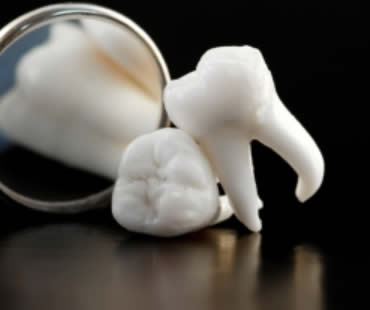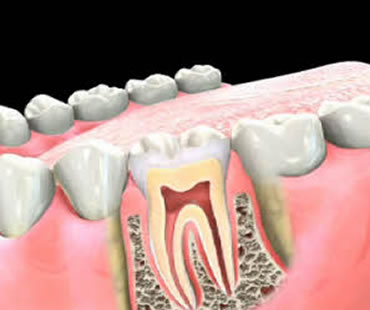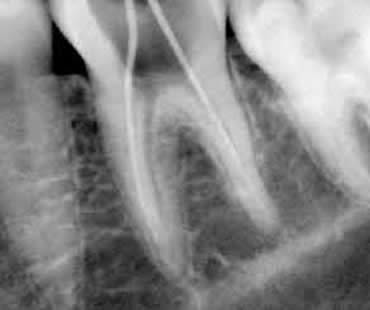
Also called third molars, wisdom teeth are the last set of teeth to erupt. Usually, people get their wisdom teeth in during their late teens and early 20s. Although some individuals have no trouble with their wisdom teeth, many people end up having these teeth removed because they may become impacted and create dental health issues. Learn more about wisdom teeth with this Q and A:
Do I need to have my wisdom teeth removed?
If your wisdom teeth aren’t causing problems, you can leave them alone. Typically, wisdom teeth are crooked or impacted, which can generate problems with the surrounding teeth. Also, wisdom teeth can be harder to keep clean, so the risk of decay on these teeth is higher.
When should I have these teeth taken out?
For optimal results, most dentists recommend wisdom teeth removal for patients when they are between 16 and 22 years old. The formation of the roots isn’t complete, so you have fewer complications.
Are there any risks?
As with any surgery, you can have issues arise, but the biggest concerns are nerve damage and dry sockets. Older patients have a greater chance of nerve damage because the root has more fully developed. Dry sockets occur when the post-surgery blood clots dislodge.
Does my age matter?
Some adults don’t experience any symptoms until they are in their 30s, 40s, or 50s. You can have these teeth extracted at any point, but when you get older, surgery is more difficult and the recovery takes longer. If you have trouble with your wisdom teeth, contact your dentist right away for a complete exam.
Longview dental office for wisdom teeth – Scott Distefano, DDS

Many oral surgeries go beyond simply removing a tooth, and the cause is not always related to poor dental hygiene. Some reasons for oral surgery just can’t be predicted or avoided, such as injuries, birth defects, or cancer. Great strides have been made in oral surgery, especially for restoration and reconstruction techniques. These are some common reasons that oral surgery is advised.
Tooth loss
Replacing missing teeth with dental implants requires oral surgery so that the titanium implant can be inserted into the jaw. Providing an alternative to dentures and bridges, implants offer a secure and permanent solution that looks very natural. Candidates with adequate bone density, good overall health, and who practice proper oral hygiene are considered for implant surgery. After the implant heals, a crown will be placed on top to complete the restoration.
Impacted teeth
One of the most common oral surgeries is to remove impacted wisdom teeth. Often occurring during the late teen to early adult years, wisdom teeth are unable to erupt properly and must be extracted to prevent future problems.
TMJ
Temporomandibular joint disorders involve the joint where the skull and lower jaw come together in front of the ear. Facial pain, headaches, popping, and jaw problems can result, and dentists try to treat the disorder with solutions like splints, physical therapy, and medications. Severe cases can require surgery to fully correct the TMJ problems.
Injuries
Car accidents, sports injuries, and other trauma can cause broken facial bones or jaws. Surgery may be necessary to realign the jaws, wire bones together, and otherwise repair the injury so that normal function and comfort can be restored.
Cleft repairs
Birth defects like a cleft lip or palate are corrected through oral surgery. Usually a series of surgeries over a span of years is needed to improve the appearance and proper function of the areas affected by the birth defect.
Biopsy
Surgery is performed to remove cancerous tumors or lesions in the jaws or facial bones. This is especially true when the joints or connecting muscles and tendons are involved.

Wisdom teeth are the third set of molars, and usually emerge in the late teens or early twenties. Standard dental practice is to remove wisdom teeth prior to them being fully formed when the roots have not yet had a chance to develop and fully root into the jaw. Younger patients usually have an easier recovery from surgery and many dentists believe early removal prevents future dental problems associated with wisdom teeth.
If your wisdom teeth were not removed as they emerged, there are some signs and symptoms that would indicate the need for extraction including:
- Wisdom teeth that are impacted, which means they have become trapped in the jawbone or gums.
- Wisdom teeth that are emerging at an awkward angle, causing pressure on adjacent teeth.
- Wisdom teeth that do not fit in your mouth, causing crowding of the surrounding teeth as well.
- Wisdom teeth that are suffering from decay or disease caused by the inability to keep them cleaned properly.
- Wisdom teeth that have developed fluid-filled cysts near the gumline.
- Wisdom teeth that are causing pain due to any of the above reasons.
The decision about whether or not to remove your wisdom teeth should be made in consultation with your dental professional. Your dentist or oral surgeon can assess the position and health of your wisdom teeth and make a recommendation for treatment.
If extraction is recommended, they may choose to extract one tooth or all four molars at once. Recovery from the outpatient procedure takes just a few days, and you will quickly be back to normal. Contact our dental office if you are experiencing any of these symptoms listed to determine if you should consider wisdom tooth removal to ensure your future good oral health.

When a tooth is seriously decayed or has become infected, a root canal procedure can be done to repair the tooth and save it. During the procedure, the nerve and pulp are removed, while the remainder of the center of the tooth is thoroughly cleaned and then carefully sealed to prevent infection.
“Root canal” is the term for the natural space within the tooth’s center. The tooth’s nerve is in the root canal, as is the pulp (or pulp chamber), which is the soft area within the root canal. Because the tooth’s nerve isn’t vital to a tooth’s health, removing it doesn’t prevent the normal functioning of the tooth.
Removing the nerve and the pulp is necessary in some cases to address irritation, inflammation and infection stemming from severe decay, damaged or deep fillings, cracked or chipped teeth or facial trauma. When the nerve tissue and pulp become damaged, bacteria begin to form within the pulp chamber. This can lead to a serious infection or abscessed tooth. An abscess can form when the infection spreads past the ends of the tooth roots.
Additionally, severe infections can lead to bone loss around the tip of the root or holes in the tooth that drain the infection into the gums or through the cheek into the skin. It can cause swelling that spreads to the face, head, or neck.
Sometimes, the only signs you need a root canal procedure are more minor. They can include tooth pain when applying pressure or chewing, discoloration (darkening) of the tooth, tenderness and/or swelling of the gum tissue, or a pimple or blemish on the gums that is recurring. Acute sensitivity to cold or hot temperatures that does not abate with time can also be a sign.
Talk to your dentist or endodontist (a dentist whose specialty is the cause, diagnosis, prevention, and treatment of diseases and trauma to the dental pulp or nerve of the tooth) about your concerns. Your dentist will know what to do so you may make the best decisions for your long-term tooth health.
If you live in the Longview area and you need a root canal, contact our dental office today.

Babies obviously can’t take care of themselves, so parents have to handle all aspects of their care. Don’t forget their oral health! Parents need to lay the groundwork for lifelong good dental habits and healthy smiles for their children. Here are some answers to common questions about baby teeth.
Do baby teeth matter?
Primary, or baby, teeth are important. They help children chew naturally and speak clearly. They provide the place for adult teeth to grown in properly later.
Should I brush my baby’s teeth?
You should brush your baby’s teeth without toothpaste, using a small amount of water instead. Use a small, soft-bristled toothbrush at bedtime to remove plaque and bacteria from your baby’s teeth and gums.
When can I start using toothpaste?
Fluoride toothpaste can be implemented after age two, when a child can be trusted not to swallow the toothpaste. Only use a small amount of toothpaste, and watch the child carefully to ensure proper brushing and spitting out the toothpaste.
When should I take my child to the dentist?
Experts recommend taking your child to the dentist when their first tooth appears, or by their first birthday. Your child should be taken for dental visits every six months, or more often if your dentist has concerns.
Do I need a certain type of dentist for my child?
You may choose a pediatric dentist who has been trained specifically to treat children. Their goal is to teach children about oral hygiene and the importance of taking care of their teeth, as well as provide a comfortable experience in visiting the dentist. However, you may also choose a regular dentist to take care of your child’s oral health. It is up to you to decide which kind of dentist is right for your family.
Our dental office is located in Longview

Most people would rather do anything than have a root canal. Unfortunately, this procedure receives a bad rap. A root canal is generally performed to clean out an infected tooth and prevent future problems. Usually, patients feel better after root canal therapy.
Knowing the truth about root canals may help you feel less apprehensive if your dentist recommends this procedure.
- A root canal hurts.
Actually, the pain you feel is caused by the swelling and pressure in your tooth. When a tooth sustains severe trauma, the pulp, or soft nerve center, may die. During a root canal, your dentist will remove the damaged tissue, disinfect the tooth, and seal off the inside. Most people only experience mild soreness afterwards, if they feel any discomfort at all. - Root canal therapy takes many appointments.
Although this timing depends on the severity of the case, most root canals are completed in one to two appointments. Once your dentist finishes the root canal, you will probably need at least one more visit for restoration of the tooth, usually with an inlay, onlay, or crown. - I only need a root canal if my tooth hurts.
Pain often lets you know you have a problem with a tooth, but if your tooth root dies you may have no symptoms. The dentist can perform tests to determine the health of a tooth, including temperature and percussion testing. - The root canal won’t last.
Once the tooth is cleaned and sealed, you should have no further problems with the tooth. Sometimes the restoration of the tooth fails, which can causes the tooth to crack or break. This usually occurs if you wait too long to have a crown or adequate filling placed.
We treat patients from Longview and the surrounding area









